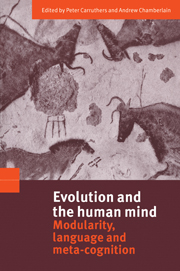Book contents
- Frontmatter
- Contents
- List of contributors
- Preface
- 1 Introduction
- 2 Massively modular minds: evolutionary psychology and cognitive architecture
- 3 Individual differences in early understanding of mind: genes, non-shared environment and modularity
- 4 Darwin in the madhouse: evolutionary psychology and the classification of mental disorders
- 5 Evolution of the modern mind and the origins of culture: religious concepts as a limiting-case
- 6 Symmetry and the evolution of the modular linguistic mind
- 7 Evolution, communication and the proper function of language
- 8 The evolution of knowledge
- 9 Mind, brain and material culture: an archaeological perspective
- 10 The evolution of strategic thinking
- 11 On the origin of the human mind
- 12 The evolution of consciousness
- 13 Evolution, consciousness and the internality of the mind
- References
- Author index
- Subject index
3 - Individual differences in early understanding of mind: genes, non-shared environment and modularity
Published online by Cambridge University Press: 18 December 2009
- Frontmatter
- Contents
- List of contributors
- Preface
- 1 Introduction
- 2 Massively modular minds: evolutionary psychology and cognitive architecture
- 3 Individual differences in early understanding of mind: genes, non-shared environment and modularity
- 4 Darwin in the madhouse: evolutionary psychology and the classification of mental disorders
- 5 Evolution of the modern mind and the origins of culture: religious concepts as a limiting-case
- 6 Symmetry and the evolution of the modular linguistic mind
- 7 Evolution, communication and the proper function of language
- 8 The evolution of knowledge
- 9 Mind, brain and material culture: an archaeological perspective
- 10 The evolution of strategic thinking
- 11 On the origin of the human mind
- 12 The evolution of consciousness
- 13 Evolution, consciousness and the internality of the mind
- References
- Author index
- Subject index
Summary
This chapter will focus on the origins of individual differences in young children's understanding of mind. While several recent studies have documented the importance of individual differences in understanding mind for children's social development, these studies have been purely phenotypic. The study presented in this chapter is the first to adopt a genetically sensitive design in order to explore both genetic and environmental influences on theory-of-mind performance. The findings suggest a strong genetic influence upon individual differences in theory of mind, and also highlight the importance of ‘non-shared’ environmental influences. The implications of these findings for the modularity of mind-reading are discussed.
Overview
Recent research into children's development of a ‘theory of mind’ has highlighted the importance of individual differences in this domain for children's early social relationships. For example, differences in young children's understanding of mind are strongly linked with differences in their shared pretence (Astington and Jenkins, 1995; Hughes and Dunn, 1997; Taylor and Carlson, 1997; Youngblade and Dunn, 1995), communication (Dunn and Cutting, 1999; Hughes and Dunn, 1998; Slomkowski and Dunn, 1996), as well as self-judgements and sensitivity to criticism (Dunn, 1995). Given that individual differences in understanding mind appear pivotal to young children's ability to adapt to their social worlds, an important new question for research is: how should these individual differences be explained?
Ultimately, all individual differences are explained by either genetic or environmental factors (or their interaction).
- Type
- Chapter
- Information
- Evolution and the Human MindModularity, Language and Meta-Cognition, pp. 47 - 61Publisher: Cambridge University PressPrint publication year: 2000
- 14
- Cited by



